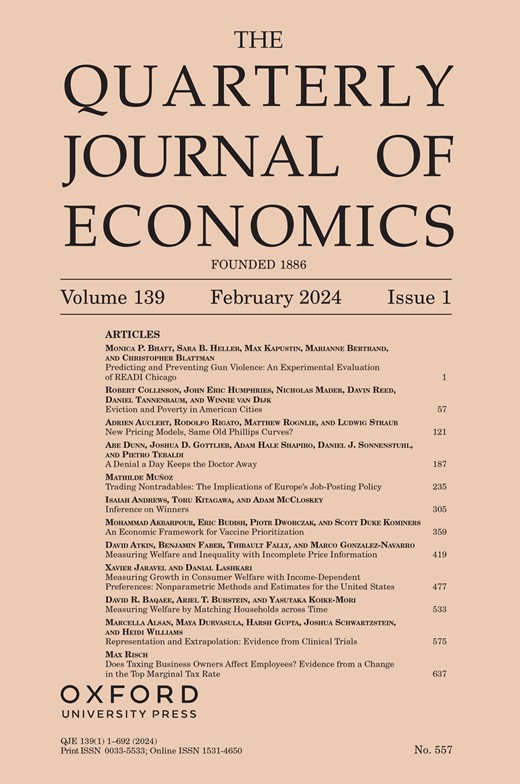协调惩罚的使用与滥用*
IF 11.1
1区 经济学
Q1 ECONOMICS
引用次数: 8
摘要
沟通有助于合作,确保破坏者受到集体惩罚。我们探讨了参与者如何滥用通信来威胁彼此,并确定了组织可以阻止滥用和恢复合作的方法。在我们的模型中,委托人与一系列相互沟通的短期代理人进行信任游戏。代理人可以通过威胁报告委托人的行为来推卸责任,然后勒索报酬。我们表明,这些威胁会完全破坏合作。调查代理人的努力,或者委托人和每个代理人之间的二元关系,可以阻止勒索并恢复一些合作。另一方面,对校长行为的调查通常没有帮助。我们的分析表明,集体惩罚很容易被滥用,除非它们的设计着眼于劝阻。JEL:C73,D02,D70。*通讯作者:Daniel Barron,西北大学凯洛格管理学院,伊利诺伊州埃文斯顿60208;电子邮件:d-barron@kellogg.northwestern.edu.作者感谢Nageeb Ali、Charles Angelucci、Nemanja Antic、Alessandro Bonatti、Renee Bowen、Joyee Deb、Wouter Dessein、Matthias Fahn、Benjamin Friedrich、George Georgiadis、Marina Halac、Johannes Hörner、Peter Klibanov、Ilan Kremer、Nicolas Lambert、Stephan Lauermann、Jin Li、Elliot Lipnowski、Shuo Liu、Bentley MacLeod、David Miller、Joshua Mollner、Dilip Mookherjee,Arijit Mukherjee、Jacobo Perego、Michael Powell、Luis Rayo、Jonah Rockoff、Mark Satterthwaite、Andy Skrzypacz、Takuo Sugaya、Jeroen Swinkels、Joel Watson以及许多会议、研讨会和研讨会的观众。我们感谢加州大学可持续发展学院理论阅读小组对本文草稿的评论,并感谢Andres Espitia的出色研究协助。本文章由计算机程序翻译,如有差异,请以英文原文为准。
The Use and Misuse of Coordinated Punishments*
Communication facilitates cooperation by ensuring that deviators are collectively punished. We explore how players might misuse communication to threaten one another, and we identify ways that organizations can deter misuse and restore cooperation. In our model, a principal plays trust games with a sequence of short-run agents who communicate with one another. An agent can shirk and then extort pay by threatening to report that the principal deviated. We show that these threats can completely undermine cooperation. Investigations of agents’ efforts, or dyadic relationships between the principal and each agent, can deter extortion and restore some cooperation. Investigations of the principal’s action, on the other hand, typically do not help. Our analysis suggests that collective punishments are vulnerable to misuse unless they are designed with an eye towards discouraging it. JEL: C73, D02, D70. ∗Corresponding author: Daniel Barron, Northwestern University, Kellogg School of Management, Evanston IL 60208; email: d-barron@kellogg.northwestern.edu. The authors would like to thank Nageeb Ali, Charles Angelucci, Nemanja Antic, Alessandro Bonatti, Renee Bowen, Joyee Deb, Wouter Dessein, Matthias Fahn, Benjamin Friedrich, George Georgiadis, Marina Halac, Johannes Hörner, Peter Klibanov, Ilan Kremer, Nicolas Lambert, Stephan Lauermann, Jin Li, Elliot Lipnowski, Shuo Liu, Bentley MacLeod, David Miller, Joshua Mollner, Dilip Mookherjee, Arijit Mukherjee, Jacopo Perego, Michael Powell, Luis Rayo, Jonah Rockoff, Mark Satterthwaite, Andy Skrzypacz, Takuo Sugaya, Jeroen Swinkels, Joel Watson, and audiences at many conferences, workshops, and seminars. We thank the UCSD theory reading group for comments on a draft of this paper, and Andres Espitia for excellent research assistance.
求助全文
通过发布文献求助,成功后即可免费获取论文全文。
去求助
来源期刊

Quarterly Journal of Economics
ECONOMICS-
CiteScore
24.20
自引率
2.20%
发文量
42
期刊介绍:
The Quarterly Journal of Economics stands as the oldest professional journal of economics in the English language. Published under the editorial guidance of Harvard University's Department of Economics, it comprehensively covers all aspects of the field. Esteemed by professional and academic economists as well as students worldwide, QJE holds unparalleled value in the economic discourse.
 求助内容:
求助内容: 应助结果提醒方式:
应助结果提醒方式:


